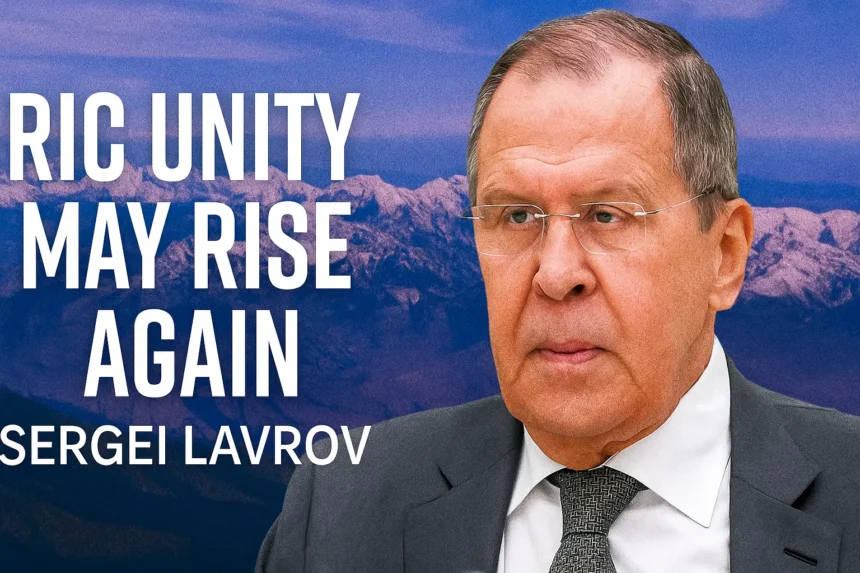RIC Unity May Rise Again: A Strategic Shift in Asian Diplomacy
The hope that RIC Unity May Rise Again signals more than a diplomatic reunion—it reflects a strategic recalibration in Asia’s power dynamics.
As Russia, India, and China begin to thaw frosty relations and explore renewed dialogue, the RIC framework is poised for a potential revival as a cornerstone of multipolar cooperation. Lavrov’s optimism isn’t just diplomatic posturing—it signals a shared vision to counterbalance Western hegemony and foster a more equitable Eurasian order. If these giants can bury the hatchet and find common ground, the RIC could become a force to reckon with in global geopolitics.
A New Dawn for Asian Diplomacy?
In a world fractured by rivalry and realignment, a faint but firm hope has emerged. Russian Foreign Minister Sergei Lavrov, while addressing the “Forum of the Future-2050” in Moscow, delivered a message that echoed like a breath of fresh air: India and China’s tensions have eased significantly, and the Russia-India-China (RIC) alliance may soon return to the global stage.
This isn’t just diplomacy—it’s about reimagining Eurasia’s future and potentially reshaping the global order. Here’s why Lavrov’s words carry more weight than mere political pleasantries, and why the world should be watching.
1. The Healing of a Himalayan Rift
For years, the India-China border standoff—especially post-Galwan 2020—kept relations frozen. But recent months have shown signs of a thaw, most recently symbolized by Indian Ambassador Pradeep Kumar Rawat’s meeting with Chinese Vice Foreign Minister Sun Weidong in Beijing.
Lavrov confirmed this shift, stating, “Tensions have eased significantly… the situation is stabilizing, and there is dialogue between New Delhi and Beijing.”
2. RIC: More Than a Meeting—A Strategic Reset?
The Russia-India-China (RIC) troika, once envisioned as a counterbalance to Western dominance, has been on pause for over two years. But Lavrov’s remarks signal a powerful intention to revive this trilateral dialogue at the foreign minister level.
He emphasized the RIC format’s potential to act as a stepping stone toward a pan-Eurasian cooperative mechanism, promoting multi-polarity in global geopolitics.
I really hope that we will be able to restore the work of the Russia-India-China trio, Lavrov stated with conviction.
3. A Forum of the Future, Rooted in Strategy
Lavrov made his statements at the Forum of the Future-2050, a high-profile Moscow event inspired by philosopher Alexander Dugin, whose influence on President Putin is well documented.
Interestingly, one of the attendees is Erol Musk, father of Elon Musk. His presence, while symbolic, underscores the global curiosity around Russia’s future-facing geopolitical vision.
This wasn’t just a policy talk—it was a strategic declaration, aimed at setting the tone for Asia’s next chapter.
4. The Pakistan Puzzle: Moscow Plays Mediator?
Lavrov didn’t restrict his statements to India and China alone. He also highlighted the need for direct dialogue between India and Pakistan, especially after Operation Sindoor—India’s strong retaliatory strike following the April 22 terror attack in Pahalgam, which killed 26 people.
The attack led to retaliatory strikes in Pakistan-occupied Kashmir, followed by a brief flare-up along the border. Military operations paused on May 10 after senior-level talks between both nations.
Meanwhile, a Pakistani delegation visited Moscow, delivering a letter from PM Shehbaz Sharif to President Putin—perhaps signaling Islamabad’s intent to deepen ties with Russia amid shifting alliances.
Lavrov’s tone was clear: Russia sees itself as a stabilizing force in the region.
5. Why the World Should Care: A Multi-Polar World at Stake
The global power balance is tilting. As the West becomes more deeply aligned through NATO and economic partnerships, Eurasian giants are seeking their own sphere of strategic autonomy.
Reviving the RIC troika could:
- Enhance regional security cooperation
- Promote energy collaboration and trade corridors
- Shape a pan-continental vision for Eurasia
- Counterbalance US-centric alliances like the Quad or AUKUS
Lavrov emphasized that Russia and China must lead this pan-continental push—hinting at the RIC’s renewed purpose.
What Makes This Moment Unique?
- The timing: This comes amid high-stakes diplomacy, military maneuvers, and shifting trade alliances.
- The symbolism: Russia as the convener, China as the economic force, and India as the democratic powerhouse.
- The urgency: With war in Ukraine and instability in the Indo-Pacific, a unified Eurasian front could stabilize global dynamics.
Final Thoughts: Can Hope Turn Into Harmony?
Lavrov’s carefully worded optimism offers more than diplomatic courtesy—it’s a sign that global tectonics are shifting again.
The revival of the RIC format wouldn’t just be another summit—it would mark a historic pivot toward dialogue over distance, cooperation over confrontation, and strategic harmony in an increasingly divided world.
In Lavrov’s words, “This will be a very important step forward in the movement of continental processes.”
Let’s hope it’s not just talk—but the beginning of something real.
Want to stay ahead of global shifts?
Bookmark TN HEADLINES24 for in-depth insights.
Follow us for real-time updates on India-China relations, RIC developments, and Eurasian geopolitics.
Don’t miss our special coverage of Operation Sindoor and its strategic aftermath.
Most read: https://tnheadlines24.com/power-play-top-3-nations-revive-secret-alliance/
Also read: https://tnheadlines24.com/modis-chenab-bridge-walk/
Disclaimer: This article is for informational purposes only and reflects the views and statements made by public officials as reported by credible sources. TN HEADLINES24 is not responsible for any actions taken based on the content of this article. Readers are encouraged to verify facts independently and follow official government updates for the most accurate and current information.








